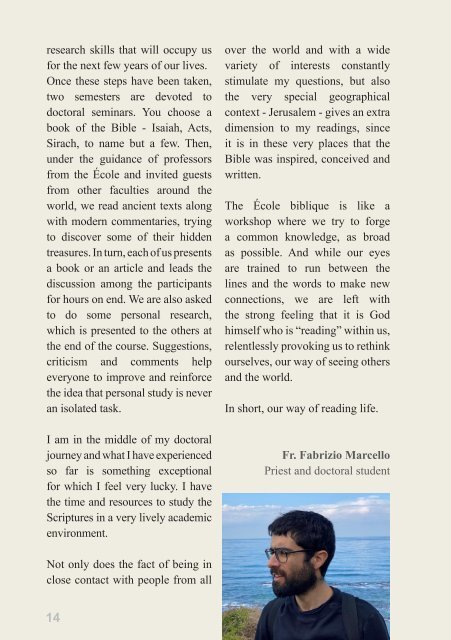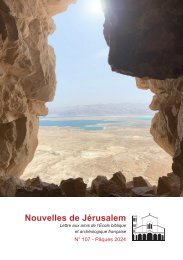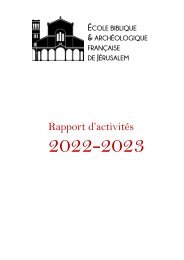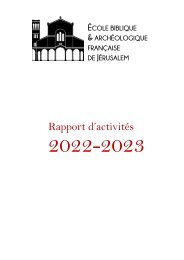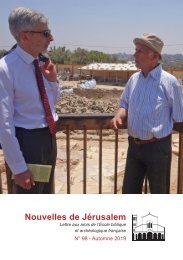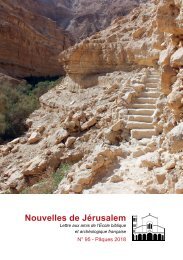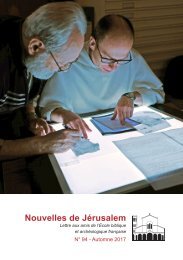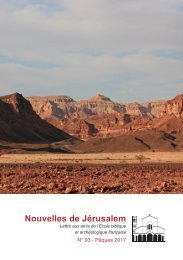Les Nouvelles de Jérusalem - Numéro 105 - Printemps 2023
Découvrez le n°105 des Nouvelles de Jérusalem. Numéro spécial sur la vie académique et l'orientation stratégique de l'École. Les Nouvelles de Jérusalem sont une revue d'informations de l'École biblique et archéologique française de Jérusalem, 2 à 3 fois par an, elles donnent un aperçu des travaux en cours en exégèse comme en archéologie, ici à Jérusalem. Les articles alternent français et anglais. Discover the n° 105 of the Nouvelles de Jérusalem. Special issue on the academic life and the strategic plan of the École. The Nouvelles de Jérusalem is an information review of the École Biblique et Archéologique française de Jérusalem, 2-3 times a year, they give an overview of the work in progress in both exegesis and archeology, here in Jerusalem. Articles are sometimes in French sometimes in English.
Découvrez le n°105 des Nouvelles de Jérusalem.
Numéro spécial sur la vie académique et l'orientation stratégique de l'École.
Les Nouvelles de Jérusalem sont une revue d'informations de l'École biblique et archéologique française de Jérusalem, 2 à 3 fois par an, elles donnent un aperçu des travaux en cours en exégèse comme en archéologie, ici à Jérusalem. Les articles alternent français et anglais.
Discover the n° 105 of the Nouvelles de Jérusalem.
Special issue on the academic life and the strategic plan of the École.
The Nouvelles de Jérusalem is an information review of the École Biblique et Archéologique française de Jérusalem, 2-3 times a year, they give an overview of the work in progress in both exegesis and archeology, here in Jerusalem. Articles are sometimes in French sometimes in English.
You also want an ePaper? Increase the reach of your titles
YUMPU automatically turns print PDFs into web optimized ePapers that Google loves.
esearch skills that will occupy us<br />
for the next few years of our lives.<br />
Once these steps have been taken,<br />
two semesters are <strong>de</strong>voted to<br />
doctoral seminars. You choose a<br />
book of the Bible - Isaiah, Acts,<br />
Sirach, to name but a few. Then,<br />
un<strong>de</strong>r the guidance of professors<br />
from the École and invited guests<br />
from other faculties around the<br />
world, we read ancient texts along<br />
with mo<strong>de</strong>rn commentaries, trying<br />
to discover some of their hid<strong>de</strong>n<br />
treasures. In turn, each of us presents<br />
a book or an article and leads the<br />
discussion among the participants<br />
for hours on end. We are also asked<br />
to do some personal research,<br />
which is presented to the others at<br />
the end of the course. Suggestions,<br />
criticism and comments help<br />
everyone to improve and reinforce<br />
the i<strong>de</strong>a that personal study is never<br />
an isolated task.<br />
I am in the middle of my doctoral<br />
journey and what I have experienced<br />
so far is something exceptional<br />
for which I feel very lucky. I have<br />
the time and resources to study the<br />
Scriptures in a very lively aca<strong>de</strong>mic<br />
environment.<br />
Not only does the fact of being in<br />
close contact with people from all<br />
over the world and with a wi<strong>de</strong><br />
variety of interests constantly<br />
stimulate my questions, but also<br />
the very special geographical<br />
context - Jerusalem - gives an extra<br />
dimension to my readings, since<br />
it is in these very places that the<br />
Bible was inspired, conceived and<br />
written.<br />
The École biblique is like a<br />
workshop where we try to forge<br />
a common knowledge, as broad<br />
as possible. And while our eyes<br />
are trained to run between the<br />
lines and the words to make new<br />
connections, we are left with<br />
the strong feeling that it is God<br />
himself who is “reading” within us,<br />
relentlessly provoking us to rethink<br />
ourselves, our way of seeing others<br />
and the world.<br />
In short, our way of reading life.<br />
Fr. Fabrizio Marcello<br />
Priest and doctoral stu<strong>de</strong>nt<br />
Portrait<br />
Frère Jonas et la quête <strong>de</strong>s origines<br />
Yunus Demirci assure le cours<br />
<strong>de</strong> topographie pour cette année<br />
2022-<strong>2023</strong>. Yunus, ou Jonas : faisons<br />
connaissance avec ce capucin,<br />
fils d’Orient.<br />
Naître sous une peau et muer : expérience,<br />
peu banale. C’est celle<br />
<strong>de</strong> Yunus Demirci. Ce capucin<br />
assure <strong>de</strong>puis cette année le cours<br />
<strong>de</strong> topographie à l’École biblique.<br />
« Toujours souriant, très vif, <strong>de</strong>s<br />
parcours découvertes plus que<br />
nourris » : les étudiants, manifestement,<br />
apprécient.<br />
D’où lui vient cette énergie ? Né<br />
Turc à Isken<strong>de</strong>run il y a 45 ans, il se<br />
découvre peu à peu Arménien. Sa<br />
mère qu’il croyait syriaque était,<br />
en réalité, beaucoup plus que cela.<br />
Des syriaques, il y en a dans la famille,<br />
<strong>de</strong>s musulmans aussi, et <strong>de</strong>s<br />
chrétiens, bien sûr. Terre bigarrée.<br />
Ce <strong>de</strong>stin, Yunus, ou Jonas, le découvre<br />
à Jérusalem où il est assigné<br />
en 2007. Ironie <strong>de</strong> l’histoire : il est<br />
Turc ? Parce que la France disposa<br />
<strong>de</strong> sa région natale en la cédant à<br />
la Turquie en 1939 pour prix <strong>de</strong> sa<br />
<strong>Nouvelles</strong> <strong>de</strong> Jérusalem - N° <strong>105</strong> - Pâque <strong>2023</strong><br />
14 15


